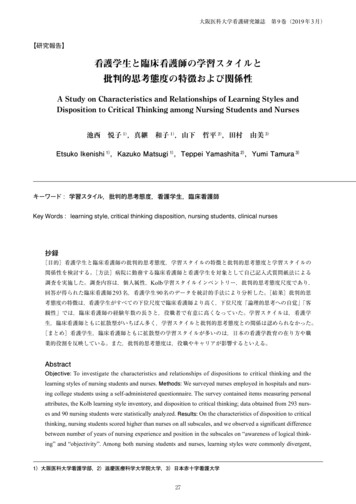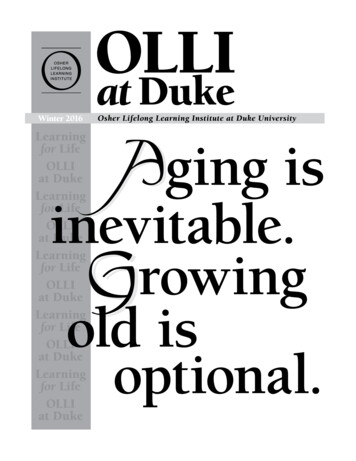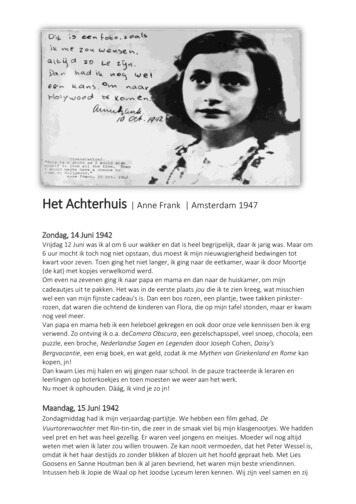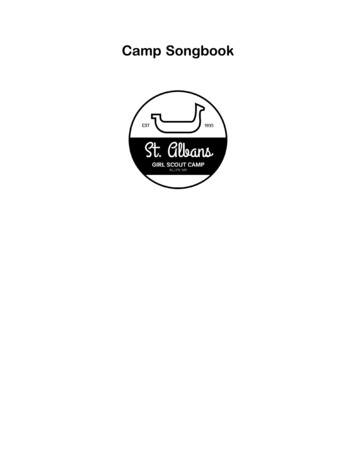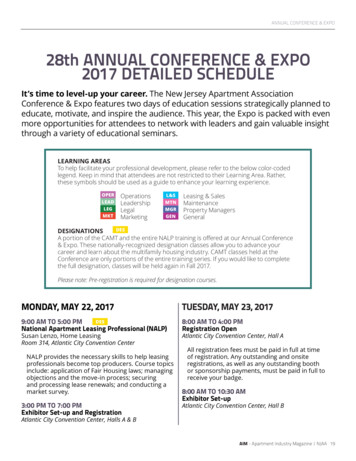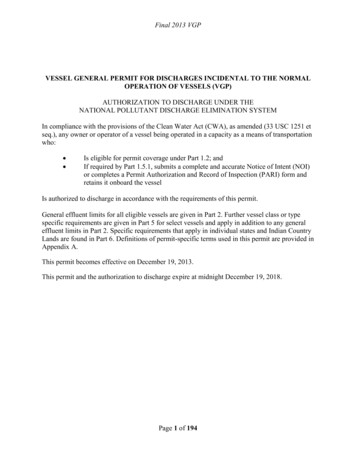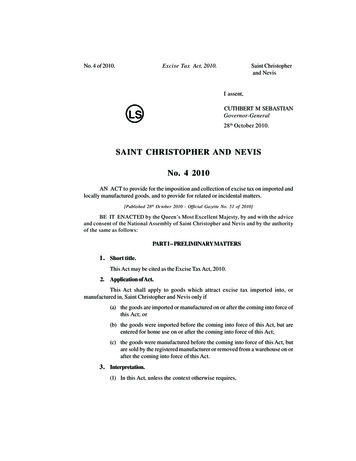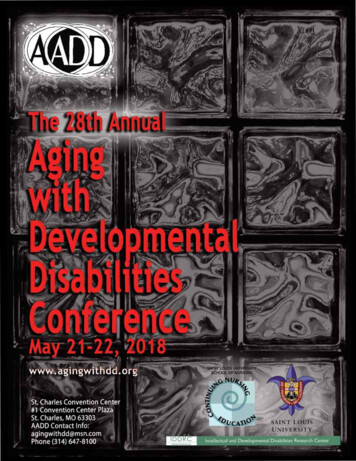
Transcription
AGINGthe 28th Annualwith Developmental Disabilities ConferenceMay 21-22, 2018Conference LocationSt. Charles Convention Center#1 Convention Center Plaza, St. Charles, Missouri 63303For More InformationContact AADD at (314) 647-8100www.agingwithdd.orgMonday, May e Psychology of Hoarding and How to Support anAging Person with DD Who HoardsMax Zubatsky, PhD, LMFT, Saint Louis UniversityDr. Max ZubatskyWhile greater awareness has been given toward hoarding and cluttering in our society, little has beenaddressed around what family members and others can do to help an aging adult with these problems.Without adequate assessment, treatment, and support interventions, hoarding will continue to remain acritical public health concern in America. Attend this session to learn skills and resources you can use toaddress hoarding issues for those with whom you work.10:30 Break10:45 Breakout Session IDIRECT SERVICE TRACK ATEACHING STRATEGIES:USING EVIDENCED-BASEDPRACTICESPROFESSIONAL TRACK BHIRING, RETAINING, ANDMOTIVATING DIRECT CARESTAFFStaff who work with people withdevelopmental disabilities who areaging often need to find creative waysto assist the individuals they supportin maintaining existing skills, meetinggoals and outcomes and developingskills for independence. Explore themost current research on EvidenceBased Practices (EBP).Learn what works (and what doesn’t)to recruit, train, and keep the beststaff who have the skills needed tosupport people with developmentaldisabilities as they age.Michael Kiener, PhD, CRC, MaryvilleUniversityCynthia L. Mueller, PhD,Licensed PsychologistNURSING TRACK CASPIRATION & CHOKINGCraig Escudé, MD, Mississippi Departmentof Mental Health Hudspeth RegionalCenter and Sherry Neal, RN-BC, CDDN,Health Risk Screening, Inc.This session will provide opportunitiesto learn how aging impacts aspirationand choking as well as steps thatcaregivers can take to prevent eitherfrom occurring.POTPOURRI TRACK DOBSERVATION SKILLS CANSAVE A LIFEJanet Whitworth, DNP, APRN, FNP-BC,Barnes-Jewish HospitalRecognizing when someone needsmedical care is critical to maintaininghealth as we age. Learn to use yoursenses to identify changes that mayrequire medical attention for those inyour care.We g r a te f u l l y a c k n ow l e d g e o u r s p o n s o r s :2
AGINGthe 28th Annualwith Developmental Disabilities ConferenceMonday, May 21 (continued)11:45 Lunch1:00 Breakout Session IIDIRECT SERVICE TRACK ADELIVERING POSITIVE LAWENFORCEMENT CRISISINTERVENTIONSgt. Jeremy Romo, MA, St. Louis CountyPolice DepartmentLearn about the training that lawenforcement receives to moreeffectively work with peoplewith differing abilities, includingcommonly used resources in crisisintervention, so that law enforcementand individuals can more successfullyinteract with one another.2:00 Break2:15 Breakout Session IIIDIRECT SERVICE TRACK AWHERE EVERYBODY KNOWSYOUR NAMEAnita Contreras, MSW, Warren CountyDD Board and Nancy Shrewsbury, MSN,SLUCare Physician’s GroupLearn how to open doors in ourcommunity and ensure thatindividuals participate in meaningfulactivities.PROFESSIONAL TRACK BPOLITICAL ADVOCACY FORTHE INDIVIDUALS YOU SUPPORT: MEDICAID, MEDICARE,AND MOREEd Weisbart, MD, CPE, FAAFP, MOChapter of Physicians for a NationalHealth ProgramLearn the compelling evidence ofthe value of Medicaid, both clinicaland economic, and understandhow to best protect Medicare for allAmericans, including the elderly anddisabled.PROFESSIONAL TRACK BOUTCOMES – TECHNOLOGYIN DOCUMENTATION;EVIDENCED-BASED FUNDINGJeff Case, PMP, TherapLearn about recent developmentsin Individual support documentationand reporting, electronic healthrecords(EHR)andtrainingmanagement from a technologyleader in the developmentaldisabilities field.3:15 Break3:30 Breakout Session IVNURSING TRACK CINCLUSION INCLUDESHOSPICEPOTPOURRI TRACK DTELECARE/REMOTEMONITORINGExplore the benefits of hospiceservicesforindividualswithdevelopmental disabilities, potentialbarriers to providing hospice care,and techniques to overcome them.Assistive technology provides asafe, cost effective alternativeto supporting individuals in theirown homes. Learn about a costeffective alternative to ensure a safe,independent, and respectful homeenvironment.NURSING TRACK CFIVE FATAL (PLUS ONE)POTPOURRI TRACK DREDUCING DISABILITY INDEMENTIA—KANSAS CITY(RDAD-KC): YEAR ONE UPDATEHolly Wamser, MSN, RN, BJC HospiceCraig Escudé, MD, Mississippi Departmentof Mental Health Hudspeth RegionalCenter and Sherry Neal, RN-BC, CDDN,Health Risk Screening, Inc.There are five conditions (plus one)that are more likely to result in deathor health deterioration for personswith developmental disabilities.This session will allow attendees toidentify why aging may increase therisk of developing one or more of thefatal five and understand the needfor close observation of the agingpopulation.DIRECT SERVICE TRACK A PROFESSIONAL TRACK B NURSING TRACK CEPILEPSY AND AGINGADAPTIVE ENVIRONMENTS SPIRITUALITYLawrence N Eisenman, MD, PhD,KateFox,MA,SpiritualDirectorFOR AGING IN PLACE ANDAttendees will increase their awareness Washington University School ofDEMENTIAMedicineof the need to attend to their ownKari Burch, OTD, OTR/L and SheilaLynch, OTR/L, Memory Care HomeSolutionsTo be considered a developmentalspiritual lives. Spiritual practices thatencourage open-hearted and centered disability, epilepsy must be diagnosedprior to age 22. However, individualsLearn how to recognize the impact presence will be explored.with developmental disabilitiesofdementia-relatedcognitivemay also be diagnosed with seizureand behavioral impairments ondisorder later in life. Learn what isindependence and safety in the homenew in the field of aging with epilepsy.environment. What are the barriers,and what modifications can be madeto help maintain independence?Jeff Grosvenor, 2Gether TechKelli Barton, PhD, UMKC Institute forHuman Development and Eric Vidoni, PT,PhD, University of Kansas Medical ngthe project titled, “Kansas CityCollaborative to Enhance Accessto Physical Activity and BehavioralSupports for Individuals withAlzheimer’s Disease and RelatedDementias,” and increase knowledgeof implementing the RDAD program.POTPOURRI TRACK DATTENTION PLEASE:ADDRESSING COGNITIVEGOALS USING MUSICMary Hitchcock-Reinhart, MT-BC, NMTFellow, Ranken Jordan Pediatric BridgeHospitalParticipants will learn interventions,using music to address cognitivegoals for individuals who are agingwith a developmental disability.4:30 Conference concludes for the day3
Tuesday, May 228:00 Registration/Exhibitors8:30 KEYNOTE ADDRESS: AUTISM & AGINGJoseph Piven, MD, Carolina Institute for Developmental Disabilities at University of North Carolina at Chapel HillDr. Joseph Pivenand Laura Klinger, PhD, TEACCH Autism Program at University of North Carolina at Chapel HillAt the end of this keynote presentation, audience members will understand the increased risk of neurologicaland psychiatric disorders of elderly people with autism spectrum disorder.9:30 Break9:45 Breakout Session IDIRECT CARE TRACK AAGING WITH I/DD: ISSEXUALITY RELEVANT?Christina Meneses, MSW, YWCA SexualHealth and Disability Education programIncrease your knowledge regarding howsexuality education can benefit adultsaging with developmental disabilities.Additionally, learn about availableresources to create a sexuality educationprogram at your organization.10:45 Break11:00 Breakout Session IIPROFESSIONAL TRACK BCONTINUATION OF AUTISM &AGINGJoseph Piven, MD, Carolina Institute forDevelopmental Disabilities at Universityof North Carolina at Chapel Hill andLaura Klinger, PhD, TEACCH AutismProgram at University of North Carolinaat Chapel HillJoin this more in-depth follow-upto the keynote presentation onelderly people with autism spectrumdisorder.DIRECT CARE TRACK ASUPPORTING AGINGPARENTSPROFESSIONAL TRACK BWHAT TO DO WHEN THEATTORNEY CALLSIncrease understanding of theperspective of aging parentsof persons with developmentaldisabilities.Learn how to usefutures planning resources to guideLifeCourse conversations with agingparents.This session will cover the differentlegal terms and processes that aprofessional may encounter in theirwork with aging individuals withdevelopmental disabilities.Sharon Spurlock, BA, St. Louis ArcMartha Brown, JD, CELA, Martha C. Brown& Associates, LLC12:00 Lunch and Award Presentations1:15 Breakout Session IIIDIRECT CARE TRACK ADISASTER PREPAREDNESSFOR PEOPLE WITHDEVELOPMENTALDISABILITIES WHO AREAGINGBeckie Gierer, MS, MO Department ofMental Health Office of Disaster ServicesLearn about the emotional impactof disasters, what emergencyplans exist, and how to support thebehavioral health needs of survivors.PROFESSIONAL TRACK BCOMPANIONING THEGRIEVINGDorothy M. Gannon, MDiv, BethesdaHospice CareParticipants will know the basiccomponents of grief, understandtypes of grief and be able to identifycomplicated grief and learn basicstrategies to support people who aregrieving.NURSING TRACK CMEDICAL OR BEHAVIORAL?WHY DETERMININGTHE DIFFERENCE CANAVOID UNNECESSARYMEDICATIONS IN THE AGINGDD POPULATIONCraig Sever, RPh, Everspring PharmacyManybehavioralissuesaremisdiagnosed or undiagnosed medicalissues. Join this session to learn how tobetter evaluate clients to accuratelyidentify the source of their problem toavoid unnecessary medications.NURSING TRACK COPPORTUNITIES FOR ORALHEALTH IN MISSOURIJohn Dane, DDS, FAAHD, DABSCD,Missouri Department of Health andSenior ServicesThis session will cover the state of OralHealth for Persons with Disabilitiesin Missouri, training opportunitiesto increase the number of dentalproviders, and how TeleHealth canimpact access to care for personswith developmental disabilities.Dr. Laura KlingerPOTPOURRI TRACK DIT’S ALL ABOUT THEPROCESS; MAKING ART ANDCOMMUNITY AT LIVING ARTSSTUDIOJeremy Rabus, BFA, Living Arts Studio/VSA Arts of MissouriJoin a local artist from Living ArtsStudio for a talk and experimentalart activity regarding the processof art and mark making, exploringthe concept of process vs. productand how that relates to all personsregardless of age or ability.POTPOURRI TRACK DASSESSING DEMENTIAIN ADULTS WITH on University School of MedicineParticipants will learn how to integrateknowledge of the elevated risk ofdementia in the Down syndromepopulation into their practice and willappreciate the dearth in knowledgeabout the behavioral assessmentand neurobiology of dementia inDown syndrome.NURSING TRACK CBREAST CANCERSCREENING—WHO, WHEN,WHY, AND HOW?POTPOURRI TRACK DHEAD INJURY AND AGING:STRATEGIES TO PRESERVEINDEPENDENCELearn best practices in earlydetection of breast issues in agingmen and women with developmentaldisabilities, including treatmentoptions, explaining diagnosis andtreatment in simple terms to theperson with an intellectual disability.This session will cover strategies topreserve independence for someonewho is aging with a head injury,including how to assess the individual’sneeds, wants and strengths tocontribute to success, and how tounderstand the brain and how a braininjury impairs daily functioning.Amy Cyr, MD, FACS, Siteman CancerCenter at Washington University Schoolof MedicineDebbie Dinzebach, OTR/L, The Centerfor Head Injury Services2:15 Break2:30 POSTNOTE: BETTER TO BE KIND THAN RIGHT: COMMUNICATION & DEMENTIA CAREJanis McGillick, MSW, LNHA, Dolan Memory Care HomesEffective communication is critical to providing supports for those with dementia. Participants will learn various communicationtherapies and best practices for successful engagement.3:30 Conference concludes4The conference planning committee has selected speakers who are experts in their field. Speakers are solely responsible for the content of their presentation.
28th Annual AADD Conference Registration InformationDon’t miss this opportunity!Click HERE toREGISTER ONLINENOWFees (includes registration, materials, and lunch)Early Registration (until May 3, 2018) 195 Conference Fee 185 Conference Fee per person for organizations sending 5 or more participantsLate Registration (after May 3, 2018) 215 Conference Fee 205 Conference Fee per person for organizations sending 5 or more participantsCEU cost 35 Additional Fee if Requesting CEUsLocationSt. Charles Convention Center#1 Convention Center PlazaSt. Charles, MO 63303Click here for directionsContinuing Education Hours (pending approval) 10 CEU Contact Hours for Missouri Nurses.Saint Louis University School of Nursing is an approved provider of continuing nursing educationby the Midwest Multistate Division, an accredited approver by the American Nurses Credentialing Center’s Commission on Accreditation.Midwest Multistate Division provider #118-II Nursing Contact Hours: pending 10 Social Work Clock Hours for Missouri Social Workers.Application has been submitted to the NASW-Missouri Chapter and is pending for preapproval of Social Work clock hours. 10 MO Nursing Home Administrators Contact Hours 10 CEU Hours for Illinois LNHA, LCPC, LPC, LSW, PT, OT, QIDP, RNFor more information regarding contact hours, please call 314-647-8100.All attendees will receive a certificate of attendance upon request.AccommodationsDiscounted hotel accommodations are availableat the Embassy Suites(click here to book reservation)(attached to the Convention Center) until May 7,2018, or you may visitwww.historicstcharles.com foradditional accommodations and areaattractions.Note: Please call 314-647-8100 with any other requests.Click HERE for PRINTABLEregistration form to mail, fax,or scan and emailMail to:AADD Conference Registration2835 Hampton Avenue, St. Louis, MO 63139or FAX to: 314-647-8105or email to: agingwithdd@msn.comQuestions?Call (314) 647-8100 or emailagingwithdd@msn.com5
Janet Whitworth, DNP, APRN, FNP-BC, Barnes-Jewish Hospital Recognizing when someone needs medical care is critical to maintaining health as we age. Learn to use your senses to identify changes that may require medical attention for those in your care. the 28th Annual We gratefully acknowledge our sponsors:



